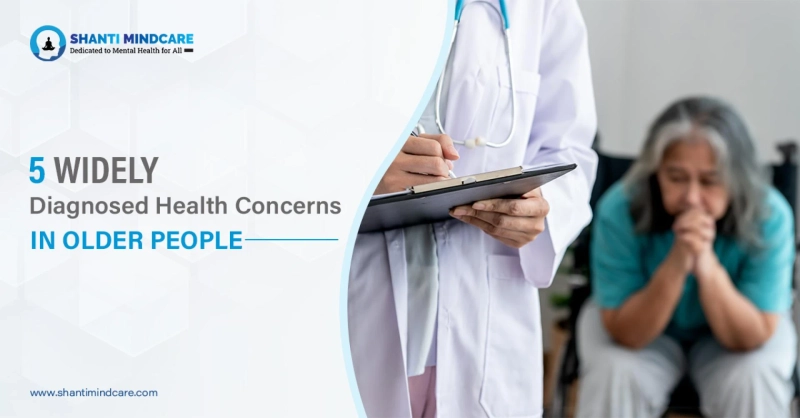Aging is an irreversible part of life and leads to a progressive decline in physiological function. With aging, cells weaken, bones shrink, and immunity eases off, which makes your elderly more susceptible to diseases or health conditions. Besides physical health concerns, mental health concerns are common in older people.
According to the World Health Organization, about 15% of adults aged 60 or over develop or suffer from a mental illness. Loneliness, social withdrawal, anxiety, a sense of helplessness, unusual thinking, behavior, denial, etc. are the emotional changes common among older people. Consult professionals at the best old age home in North Bengal.
Given below are five widely diagnosed health concerns in old age people:
Cardiovascular Conditions
Cardiovascular conditions are common in older people, especially high blood pressure (hypertension). Cardiovascular problems are associated with the blood vessels, heart valves, heartbeats, heart muscle, etc.
Frequently experienced signs and symptoms include chest pain, chest tightness, pressure felt in the chest region, shortness of breath, unexplained fatigue, unexplained weakness, numbness, or pain in the arms, throat, and legs. Medical attention and follow-up checkups are essential for their well-being.
Arthritis
Arthritis or joint inflammation can affect one or more joints and lead to swollen, or inflamed joints. In many cases, if the condition remains unmanaged results in trouble movement. Arthritis more commonly takes place in the joints of the lower back, hips, knees, hands, etc. Typically, it gets worse with age.
Osteoporosis (bones become brittle and weak) and rheumatoid arthritis (a chronic inflammatory disorder that affects the body’s immune system) are two of the main types of medical joint inflammation. Arthritis has further types gout, ankylosing arthritis, psoriatic arthritis, etc. Get your elderly optimum old age care in Siliguri at the most reputed old age home in the region.
Diabetes
Diabetes is a chronic/long-term disease that impairs how your body utilizes glucose in an effective way. Proper diet, exercise, and maintaining medication plans advised by the doctor help benefit well-being.
Type 2 diabetes is more common in this case, which involves signs like unintentional weight loss, frequent urination, irritability, fatigue, weakness, skin infections, blurry vision, slow-healing cuts, wounds, and sores. For people who have gestational diabetes (in women) and prediabetes, the risk of developing type 2 diabetes is higher if lifestyle and preexisting health conditions are not well-maintained.
Depression
Geriatric depression is more frequent in older adults and it’s a mood disorder. Persistent sadness, fatigue, apathy, sleep problems, lack of concentration, crying spells, pain and aches, changes in appetite, restlessness, withdrawal, suicidal thoughts, etc. are common signs here.
However, there’s no single reason for geriatric depression but risk factors include a family history of depression, exposure to traumatic life events, low levels of norepinephrine, serotonin, etc. For dedicated care for your elderly, you might contact the most trusted old age home in North Bengal.
Alzheimer’s Disease
Alzheimer’s disease or senile dementia is a progressive (develops slowly) brain disorder. It mainly affects memory and also impacts other cognitive skills. Untreated Alzheimer’s disease may even interfere with the ability to perform the simplest or day-to-day familiar activities. You can get your elderly optimum old age care in Siliguri at the most trusted elderly care home.
This brain disorder is more common in people over the age of 65, which causes brain cells to shrink. Declined thinking ability, reduced reasoning ability, forgetfulness, wandering, decreased capacity to perform familiar tasks, delusions, anger, depression, poor decision-making skills, social withdrawal, mood swings, etc. are symptoms associated with this disease.


